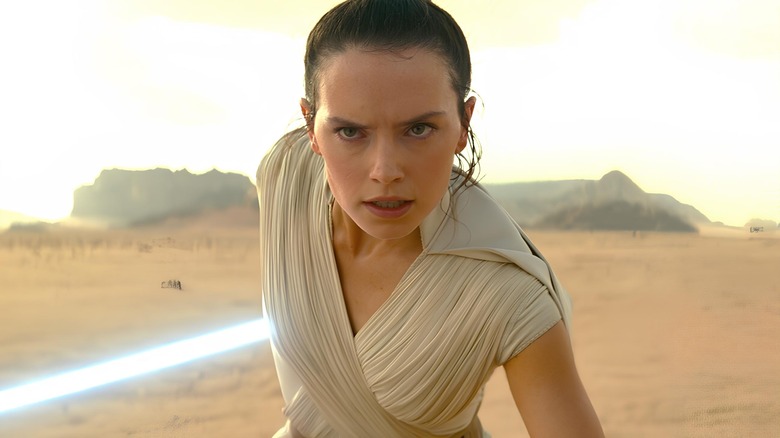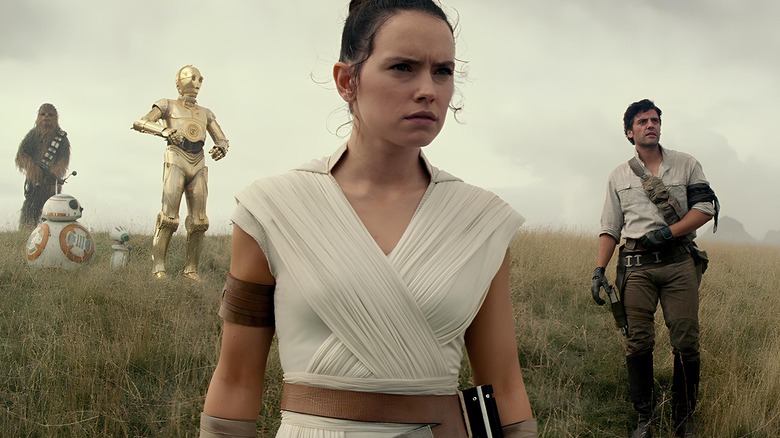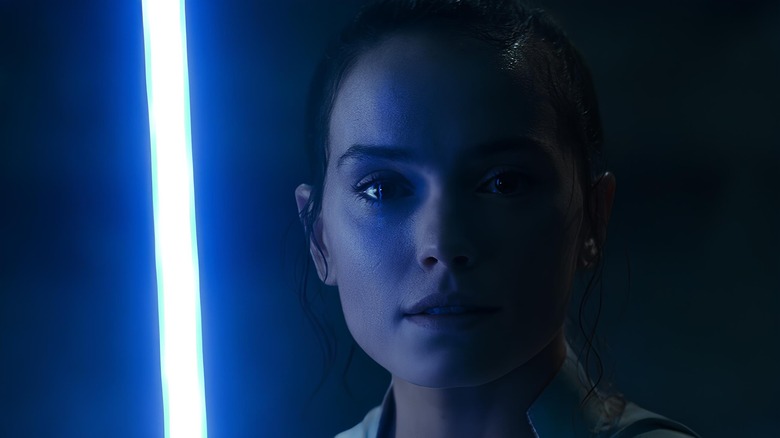Who Is Rey In Star Wars: The Controversies Around Her Divisive Lineage Explained
In "Star Wars: Episode IV – A New Hope," a young farmhand (Mark Hamill) is plucked from obscurity to save the galaxy. Informed of his true lineage as the son of Darth Vader, he confronts his father. Though he is tempted by the dark side of the Force, he ultimately defeats the evil Emperor Palpatine (Ian McDiarmid) and turns Vader to the light side in the Sith lord's final moments.
At first blush, Rey Skywalker (Daisy Ridley), the chief protagonist of the Disney-era "Star Wars" trilogy, appears cut from the same cloth. A nobody from the desert planet Jakku, she rises above her station to destroy the First Order, a resurgent branch of the Empire. Learning of her true lineage as the quasi-granddaughter of Emperor Palpatine, she confronts him. Though tempted by the dark side, she defeats the Emperor and turns Kylo Ren (Adam Driver) to the light side in his final moments.
But Rey's story is not nearly as clear-cut as Luke's. Across the three movies in Disney's sequel "Star Wars" trilogy, Rey was constantly redefined, and the backstory that was finally solidified for her in "Star Wars: Episode IX – Rise of Skywalker" reversed some of the most crucial plot points from the previous movie, "Star Wars: Episode VIII – The Last Jedi." While plenty of "Star Wars" fans bickered over the relative qualities of "The Last Jedi," the abrupt about-face in "Rise of Skywalker" did not calm tensions. Instead, it made fans even more upset and confused.
Rey went from hero to zero
Rey was introduced to the "Star Wars" universe in the 2015 film, "Star Wars: Episode VII – The Force Awakens." Directed by J.J. Abrams, it introduced Rey as a misfit. Living on the desert planet Jakku, Rey is haunted by an absence of identity. Having lost her parents as a young child, she does not know where she came from. Although the events of the film see her discover a latent Force sensitivity and lightsaber aptitude, the question of her lineage remains unresolved as the credits roll.
The subsequent film, Rian Johnson's "Star Wars: Episode VIII – The Last Jedi," picks up on that thread and unravels it. At the film's climax, Rey learns that, unlike most other "Star Wars" protagonists from Anakin Skywalker (Hayden Christensen) to Luke Skywalker, she has no noble lineage. She is not the daughter of great heroes, nor of villains, but rather the offspring of destitute junk traders. Her heroism, as symbolized by her Force sensitivity, is therefore not predestined, but rather an innate quality. She becomes a hero not because of prophecy or fate, but because it is the right thing to do.
With "The Last Jedi," Johnson hoped to deconstruct the long-held tropes of "Star Wars" and turn them on their head. But whether he succeeded depends on who you ask. While the movie earned critical acclaim and made over $1.3 billion at the global box office, a loud subset of fans vocally decried it as an affront to "Star Wars." Much of their ire was directed at Rey's storyline, as they felt the choice to make her the daughter of peasants diminished her as a character. Proponents of "The Last Jedi" claim that its detractors didn't understand the film, but those critics retort that they understood it all too well.
Rey went from zero to Skywalker
In what has widely been perceived as a response to "The Last Jedi" backlash, Disney handed the directorial reins back to J.J. Abrams for the third film in the trilogy. The resulting "Star Wars: Episode IX – Rise of Skywalker" performed well at the box office but was thrashed by critics and fans alike for a plot that seemed more like the work of an internet fan-fiction writer than that of seasoned Hollywood professionals. Atop the list of fan gripes was, once again, the movie's treatment of Rey.
"Rise of Skywalker" retcons Rey's nobody origins from "The Last Jedi," revealing that she is the granddaughter of Emperor Palpatine. Well, not exactly a granddaughter, but the daughter of one of Palpatine's clones. The Emperor's plan had been to use her Force-sensitive body as a vessel for his own spirit, a plan Rey foiled at the last moment with the help of a reformed Ben Solo. She then takes on the Skywalker family name, symbolizing her total rejection of the dark side.
Ultimately, the conclusion to Rey's story left almost no one satisfied except for Daisy Ridley. Some fans nurse a grudge against "Rise of Skywalker" for undoing the work "The Last Jedi" did to differentiate Rey from previous "Star Wars" protagonists, while those who despised "The Last Jedi" see the convoluted Palpatine connection established in "Rise of Skywalker" as a clunky way of patching over their concerns.
Recent "Star Wars" media has strayed far afield of the sequel era, preferring instead to explore the period on the "Star Wars" timeline prior to those films. Shows like "The Mandalorian" explore the immediate aftermath of the original trilogy, while those like "Andor" explore the time before it. However, Rey may soon return in the upcoming "Star Wars: New Jedi Order."


